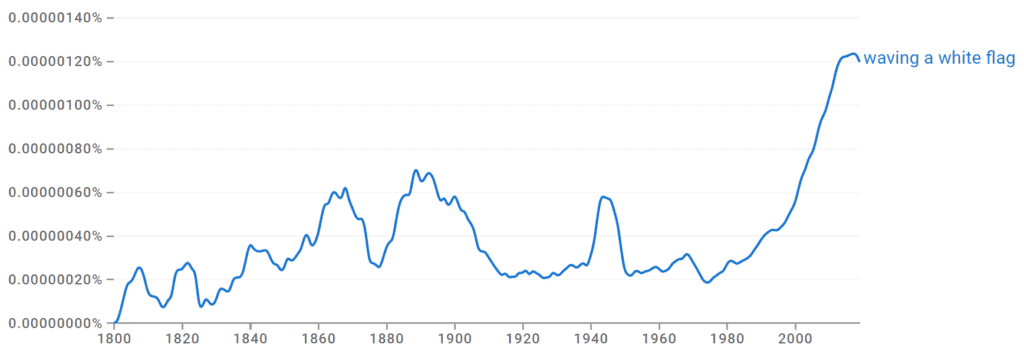In the expansive sea of English idioms, waving the white flag stands as a potent symbol. Despite the lack of actual flags, this expression conveys a vivid message and is a fine example of how idioms can condense complex ideas in just a few words. So, let’s see what this old idiom is all about! I’ll even share a few sentence examples.
Waving the White Flag Meaning
In its most literal sense, the act of waving a white flag is supposed to represent surrender in some way, mostly in war. By extension, the idiom carries the same implication, just a lot less violent.
If someone is waving the white flag, they admit defeat or show their desire to stop fighting or arguing. It’s like another way of throwing up your hands and saying, “I give up!”
Origin of Waving the White Flag Saying
The practice of using a white flag as a symbol of surrender goes back centuries and has been something used in many cultures around the world. The symbol was known to have been used during the Han dynasty in China but was also mentioned as being used in a Roman battle in 109 A.D.
In Western culture, you’ll find that its usage is recorded as far back as Roman times. But it wasn’t until the 19th century, particularly with the 1864 Geneva Convention, that the white flag was officially recognized as the universal symbol for truce and surrender.
Synonyms for Waving a White Flag
Switch things up and use one of these great synonyms for waving a white flag that might be more popular.
- Surrender
- Yield
- Give up
- Throw in the towel
- Raise the white flag
Waving the White Flag Examples in a Sentence
And to top things off with a little context, here are a handful of full sentences showing you how to use the idiom in conversation or your writings.
- After years of legal battles and huge lawyer bills, the company finally decided to wave the white flag and settle the case out of court.
- I’ve been trying to fix this junky old car for hours, but I think it’s time to wave the white flag and call a professional mechanic.
- The professional chess player waved the white flag when it was clear that he was in checkmate.
- After failing to convince her classmates to choose a different theme for the school party, Sarah finally waved the white flag and agreed to go with their poor choice.
- As a parent, you learn when to wave your white flags and let your kids have extra screen time.
- I don’t want to fight anymore; this is me waving the white flag of surrender.
Never Surrender to Bad Grammar
Understanding the expression waving the white flag enriches your command over English idioms and allows you to convey complex ideas with simple phrases. You can apply this common phase to any situation requiring surrender, whether admitting defeat in a board game or a serious fight with someone in your life.
Enjoyed reading about this idiom? Check out some others we covered:



